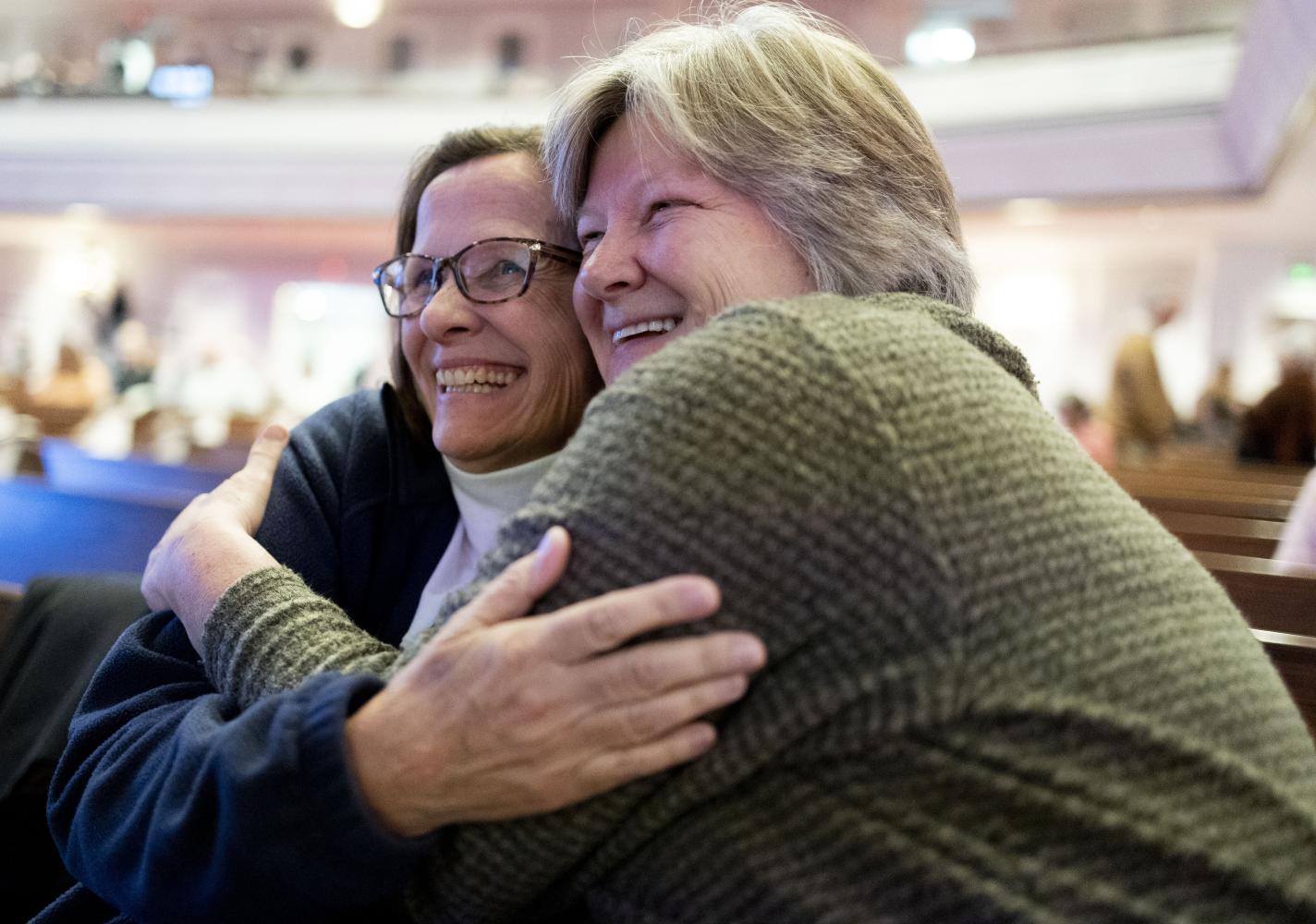On any Sunday morning, on the second floor of First Baptist Church, there may not be much talking, but the deaf activity room is anything but quiet. From the sounds of hands telling interactive stories through American Sign Language to the laughter of old friends, the members of the deaf community file in one after another to be in fellowship together.
First Baptist Church’s deaf community has been slowly growing, ebbing and flowing for more than 35 years, and has continued to show love and support to its members, whose levels of hearing vary.
Jeannie Taylor is a hard of hearing individual who is immersed in deaf culture. Hard of hearing individuals have hearing loss ranging from mild to severe, according to the World Health Organization.
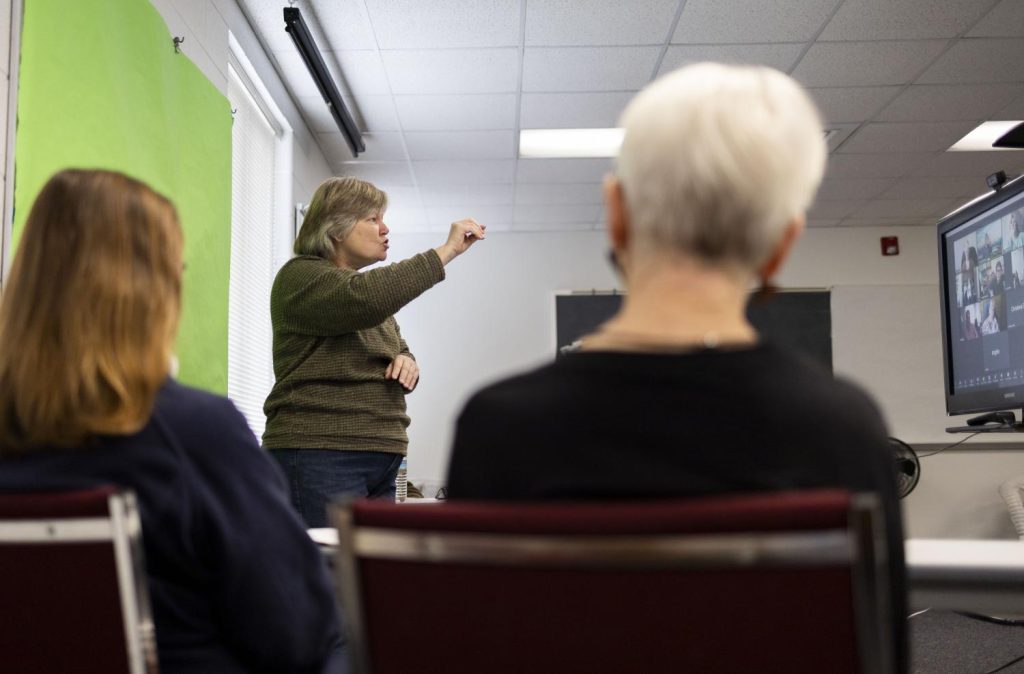
Beth Driver (left), coordinator of the First Baptist Church deaf ministry uses American Sign Language during a Sunday school class on Sunday, Feb. 25. Driver said she started teaching the deaf ministry Sunday school class at the church in 1993. (Photo by Brodie Curtsinger)
Taylor has attended the services at First Baptist Church for 13 years since first moving to Bowling Green in 2011. Taylor attends the church because of its deaf ministry.
Taylor said when she was diagnosed with progressive hearing loss in the 1960s as a young girl, she didn’t have access to special programs allowing her to learn sign language or understand what was being taught. She said she focused on reading the material she was given to teach herself the subjects.
Taylor said she became interested in learning American Sign Language in her late 40s. Her hearing aids and lip reading seemed to not be enough anymore as her hearing got worse, Taylor said. With her late start to the language, she said it would be critical for her to be involved in a deaf community.
“I knew that it was going to be important for me to be in a community of deaf people. The church was here, and it was just perfect for me,” she said.
Taylor said going to church and learning from the Bible were key practices throughout her childhood. She said she was able to grasp certain ideas within the Bible because of her strong reading skills — a skill not all people within the deaf community are afforded. This is due to deaf children not being able to understand the sounds of different words, making it harder to sound out English words to learn reading skills, according to James Booth, a neuroscience professor at Vanderbilt University.
“The deaf community is different. They’re so restricted with what they have access to,” Taylor said. “I’ve learned a lot from them because I realized how limited their access was to Bible teaching.”
With only 10 deaf ministries in Kentucky, Taylor said, the lack of resources for deaf people in religious settings are what make the presence of deaf churches and ministries essential.
Taylor said the most difficult aspect of her faith was the absence of music over the years due to her love for it. Taylor said she cannot hear certain frequencies, making it hard to hear the different instruments or vocals during worship.
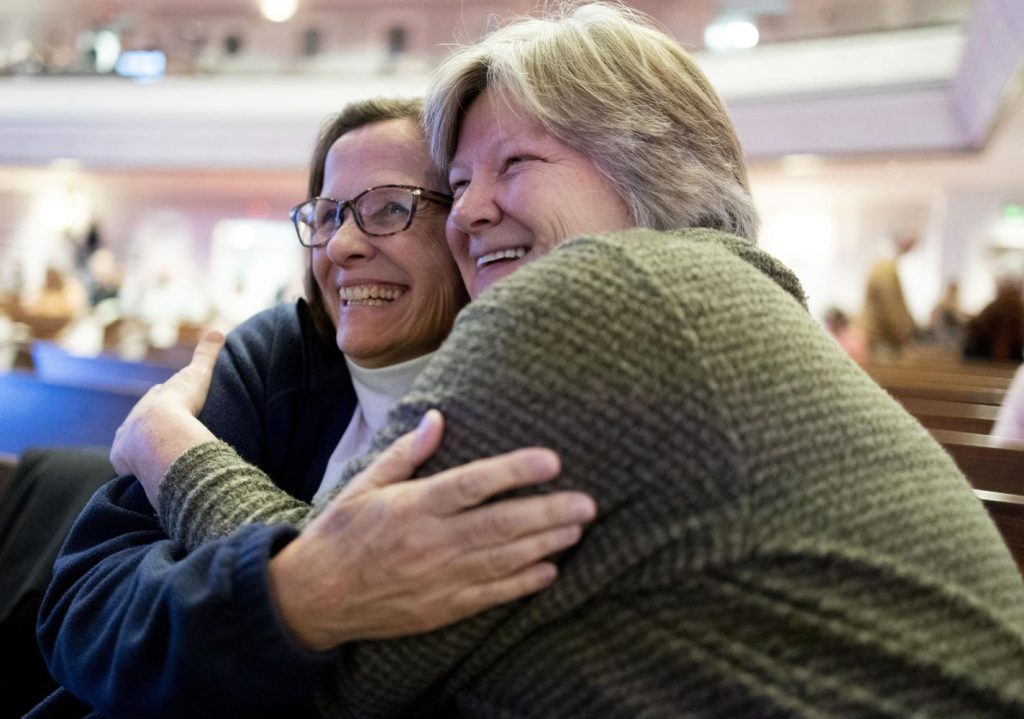
First Baptist Church deaf ministry member Cheryl Gahimer (left) and deaf ministry coordinator Beth Driver share a hug before the churchís worship service on Sunday, Feb. 25. Driver said she joined the deaf ministry at the church in 1992. (Photo by Brodie Curtsinger)
“The music is the hardest part for me, because I loved music. I grew up playing the piano and the clarinet, but now, as my hearing worsens, it’s harder and harder for me to enjoy music,” she said.
Taylor said although she misses the music, her situation is not the case for every deaf person. When asked to rise and sing, many members of the deaf ministry will sign the song being sung by the choir.
“We sing with our hands, and that’s their normal. So sometimes I think, you know, they must be missing something, but they’re not. That’s their normal. You don’t know you miss something if you don’t have it,” Taylor said.
Throughout the church service, Taylor said she is dependent on the interpreter as well as her hearing aids to catch the full meaning of the message being preached.
“What I miss auditorily, I pick up with the interpreter’s signs. What I miss through signs, hopefully I catch auditorily. It’s a give-and-take throughout the whole worship service,” Taylor said. “I’m just trying to fill in gaps of missed information.”
Taylor said that by the time she leaves church every Sunday she is completely exhausted. One-on-one conversations are much easier and less exhausting for her, and group settings tend to be too overstimulating, causing her to miss some information here and there, she said.
However, she said her practice with signing and the growth of the community was worth the exhaustion.
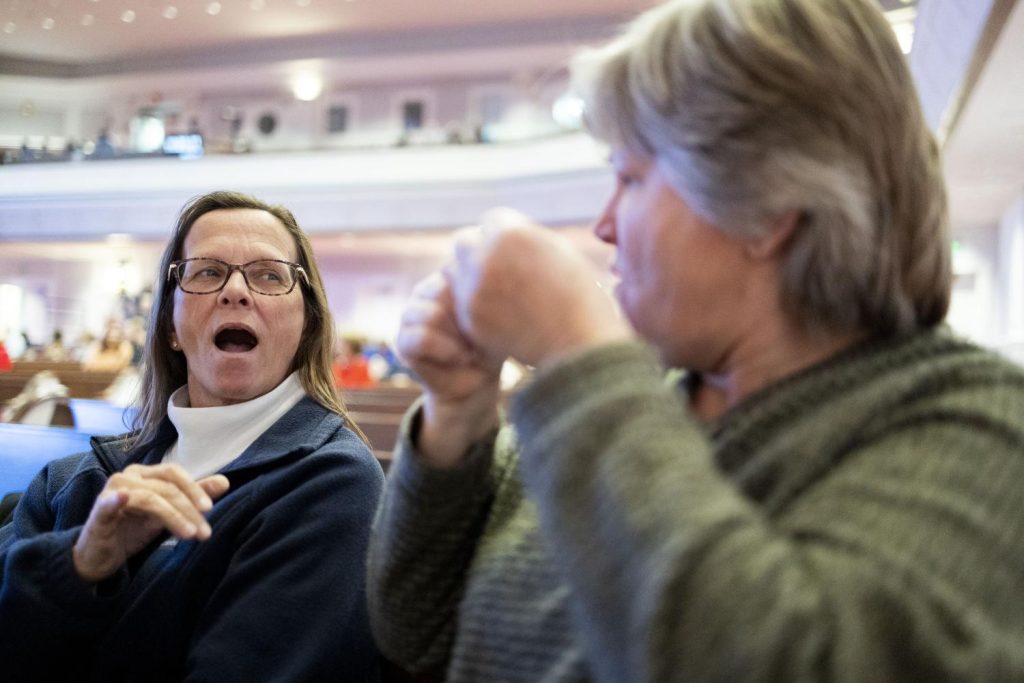
First Baptist Church deaf ministry member Cheryl Gahimer (left) and deaf ministry coordinator Beth Driver show praise with their hands after a baptism on Sunday, Feb. 25. (Photo by Brodie Curtsinger)
“Some of my best friends, the sweetest and closest friends, go here. I wasn’t born deaf, but in every other way, I feel like I identify with them, and they treat me like I’m part of the Deaf community,” Taylor said. “I’m not fluent by any stretch of the imagination, but they’re always patient with me. I’ve learned a lot from them and admire their faith.”
For interpreter Rosalind Spillman, a hearing individual, the church service looks drastically different. Being the only interpreter in the church, Spillman works every Sunday by translating the service to ASL to ensure the deaf members of the church are able to hear the Word.
Every week, Spillman comes prepared. Whether she is transcribing the different songs played each week into “ASL Gloss,” the written form of ASL, or looking for the meaning of the words to translate them, she said she is constantly striving to make sure the message is understood for those who would like to see it.
“It’s important to interpret Sunday services so the deaf will understand the message and participate in the service,” Spillman said.
Spillman said she started her American Sign Language journey at 16 years old when the pastor at her church contacted a prominent deaf minister to set up a deaf ministry at Forest Baptist Church. She took classes every Sunday to learn the language and started interpreting classes with the church a few years later.
“We didn’t plan to do that at all, we just started by finding a hymn before church on Sunday morning, looking at the interpreter to learn from her and learning from the deaf themselves,” Spillman said. “After that we started interpreting the services ourselves, our interpreter left, and quite a few of the deaf started coming to the service.”
Spillman said ASL as a language focuses more on direct wording in contrast to the many metaphors in English. With a complex sentence structure, it is about more than just signing English.
“I’m signing more ASL, what the meaning is, which is difficult sometimes with the hymns because there’s so many symbolic words and phrases,” Spillman said.
She said her favorite part of her job is when all of her hard work throughout the week comes together and she is able to sign with the community.
With the songs projected on a big screen behind her, many people in the community will look at her and the lyrics behind her, as well as watching the choir sing.
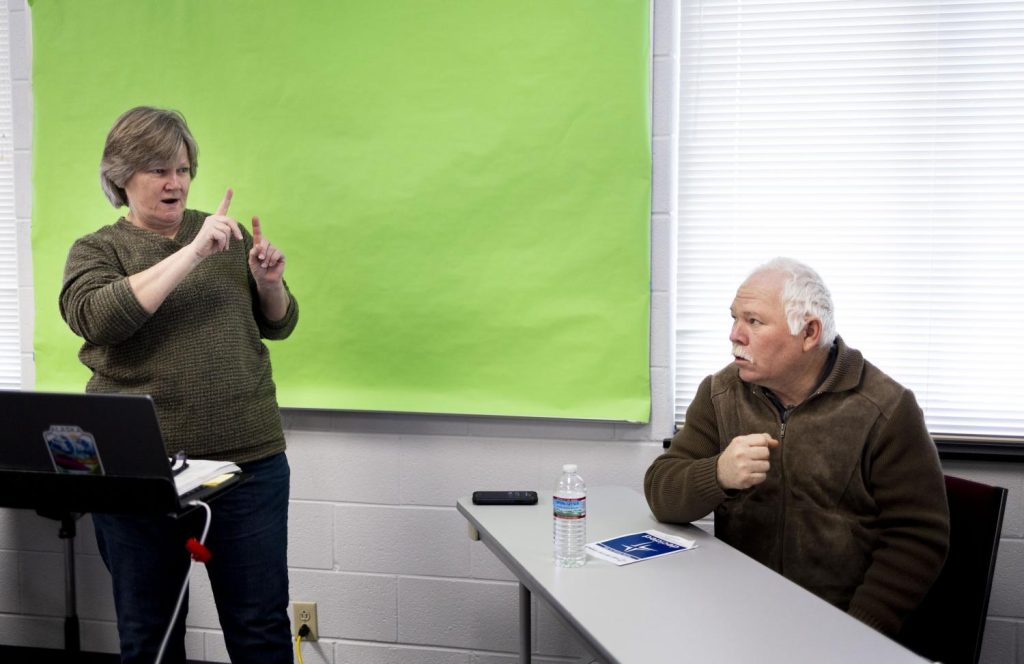
Beth Driver (left), coordinator of the First Baptist Church deaf ministry uses American Sign Language during a Sunday school class on Sunday, Feb. 25. Driver said she started teaching the deaf ministry Sunday school class at the church in 1993. (Photo by Brodie Curtsinger)
“Seeing everyone sign together and watch the screen to really get the meaning behind the message is my favorite part,” Spillman said.
Spillman said the Deaf church community in Bowling Green would not be what it is today without the help of the late Joyce Wilder. Wilder, whose parents were born deaf, was committed to improving access to ASL through interpreting services and creating the ASL minor at WKU.
“We supported each other; she would fill me in on signs I didn’t know and was just focused on being involved,” she said. “She was involved not just as an interpreter, but as a friend.”
Deaf Bowling Green native Beth Driver said she has been coming to First Baptist Church weekly since she was a little girl, originally accompanying her grandparents. She said the church is where she was first exposed to sign language, with her grandmother bringing her around to talk to church members.
Driver spent 13 years in Danville at the Kentucky School for the Deaf before returning to First Baptist Church, and she has been teaching Bible study there since 1992. She has built a substantial community that comes to her teachings every Sunday. Driver said people use Zoom to connect from all over the United States and Canada to listen to her talk about the scripture.
Driver said that her Bible study has helped her not only teach others but to learn more about the faith herself.
“When I was asked to start my Bible study, I was a new Christian. I didn’t know everything, but I was willing to try to teach others,” Driver said. “As I have been teaching, I learn new things all the time. Sometimes I will see something I didn’t notice before; I’ll have someone show me something new. I’m always learning.”
Driver said that sometimes it can be difficult to be fully involved in other services at the church as a deaf person. Although there is a Deaf community at First Baptist Church, not everyone who attends the church knows the language. With only one interpreter provided at each service, Driver said it was hard to communicate with anyone outside of her community.
“Some people know some signs, like my secretary; I’m teaching her, but other than that, not many people here outside of the deaf ministry know ASL,” Driver said.
Sometimes I will see something I didn’t notice before; I’ll have someone show me something new. I’m always learning.”
– Beth Driver
Driver said that she watches the cantor leading the worship songs every week and watches the interpreter to understand the message of the songs. She said she wears her hearing aids during worship, but she tries not to use them for other occasions. With her hearing aids in all the time, Driver said the noise can get to be too much, making her frustrated.
“Everyday use, I don’t wear them; I need a quiet mind. I worship with hearing aids, though, to listen, and sometimes it’s really beautiful,” she said.
Driver said that wearing her hearing aids doesn’t make the experience; it adds to it.
“It’s cool to listen to all the different voices come together, the highs and the lows, the drums, the flute, the harp, all the different sounds,” she said. “Wow, it’s beautiful. I wish everyone could hear it, too.”
With the loss of hearing, Driver said many deaf individuals have other senses heightened, including what one can feel. Sitting up close to the stage allows each person to feel the vibrations of the songs come together. Driver said that everyone can feel these vibrations from the instruments, but other people in the congregation can hear what accompanies them.
Driver said the community at First Baptist Church has helped her grow her faith in many different ways.
“I will watch someone talk about their faith, and learn from that, or we will help each other with hard questions, making our faith stronger,” she said. “The fellowship here really helps to strengthen your relationship with God.”


